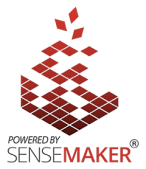“The human species thinks in metaphors and learns through stories.” —Mary Catherine Bateson, anthropologist
 The 2015SAKMS team are pleased to introduce SenseMaker®, leading edge software created by Cognitive Edge, as one of the ways we will harvest and make sense of our experiences and learning through the Summit.
The 2015SAKMS team are pleased to introduce SenseMaker®, leading edge software created by Cognitive Edge, as one of the ways we will harvest and make sense of our experiences and learning through the Summit.
This powerful tool offers a simple way to capture, self-index and share small stories or micro-narratives, to help make collective sense of a particular theme or topic. At the 2015SAKMS, SenseMaker® will help us capture and weave together our shared exploration, and we invite you to share your stories, insights, ideas and reflections around Knowledge Management – both before and during the Summit.
Watch creator Dave Snowden introducing SenseMaker® in this video:
Share your stories
Whether you will be a SAKMS2015 delegate this year or not, we invite you to be part of the Summit experience by capturing your stories of insights, learning moments, encounters and shifts in your own KM journey. Please also share this opportunity with your colleagues, clients and other KM stakeholders to help us gather a broad range of stories!
There is no right or wrong way to share your stories, and it is better to share a number of smaller fragments than to try to create one long story. The tool offers you a range of options – including capturing audio or images to support or tell your story – and the process is designed to be simple and intuitive, needing no more than a few minutes per story. A full report will be published after the Summit for you to see the results.
Sharing your stories and knowledge is key to the development of our KM community. By using this tool, you will enhance the summit experience and contribute to new insights in the field of KM, so please journal often!
Start Now
Download the SenseMaker® Collector app (from CognitiveEdge) on the Android or Apple Store.
- The first time you open the App, it will request some information in a User Profile. Your entries are anonymous, but this information enables demographic analysis.
- Once your profile is complete, go back to the app menu and select ‘Download Activities’.
- Use the Collector App Code ‘2015SAKMS‘ to download our Summit survey template.
Begin to capture your stories of insights, learning moments, KM breakthroughs and challenges!
As an alternative to the app, you may use SenseMaker® online.
Read more about SenseMaker® and its applications on the Cognitive Edge website.
